Before I say anything about the current GP crisis, I’d like to set something straight. I am a GP and I see patients face-to-face. But I mostly speak to them on the phone, for a few reasons which I will set out later.
I am also a patient. And a carer. At the practice where my family is registered, the GPs are not seeing patients face-to-face. We have not had an in-person appointment since 2019, in fact.
My pharmacist tells me the GPs there do not want to stop working from home – due to the risk of Covid. He is an older, Asian man, so not at low risk from Covid, but has been standing at his counter the whole way through this pandemic, looking after people. He is, understandably, disgusted.
We have been dealt with well over the phone, but the situation is made more frustrating by the fact that most of the appointments our family needed with hospital doctors and clinicians over the past 18 months or so have been face-to-face. Even during the Covid peak in January this year.
I know patients have left the surgery, as they are so fed up. People on my local Facebook group are now planning to petition the practice to resume normal service, and I support this. So I totally accept the frustrations of patients right now, because I am living through it myself.
And whether GPs like to admit it or not, we all have colleagues who do not see patients. But please don’t tar us all with that brush.
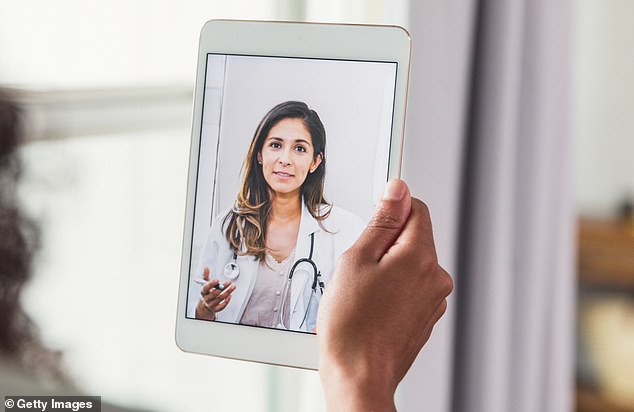
At the practice where my family is registered, the GPs are not seeing patients face-to-face. We have not had an in-person appointment since 2019, in fact, writes Dr Ellie Cannon
The Mail on Sunday was the first to raise the alarm over the lack of face-to-face GP appointments, last year. Our campaigning led to the Government issuing guidance in May, instructing GPs to offer face-to-face appointments should patients request one. It was a blunt response, and failed to recognise that many of us were doing just this, so it hacked off a lot of hardworking GPs. But it was probably necessary.
Over the past few weeks, our sister paper the Daily Mail has followed our lead, running stories that suggest, in some areas, problems persist. As we reported in May, roughly 55 per cent of GP appointments are in person – a figure repeated in the recent coverage, showing things have not changed.
But statistics alone reveal very little about what’s really been going on in general practice right now – and that’s what I want to address.
I’ve felt reluctant to add to the current noise around this subject, as much of it has been unhelpful. For instance, calling for face-to-face appointments to be the ‘default’ again. Even if this were possible, which I doubt, it wouldn’t solve things and would probably make matters worse.
Making unworkable demands is stoking antipathy and exacerbating anxieties that many patients feel about the changes to the system.
Here’s a case in point. Last week, a patient sat in a consultation with me, quite distressed, and said: ‘Why can’t I see you face-to-face?’
‘You are sitting right in front of me,’ I said. ‘But I had to call first,’ was her reply.
This exchange perfectly illustrates the situation. There is, for want of a better term, a ‘new normal’ in general practice. You can’t any longer just turn up to your surgery and wait for an appointment – you have to call first.
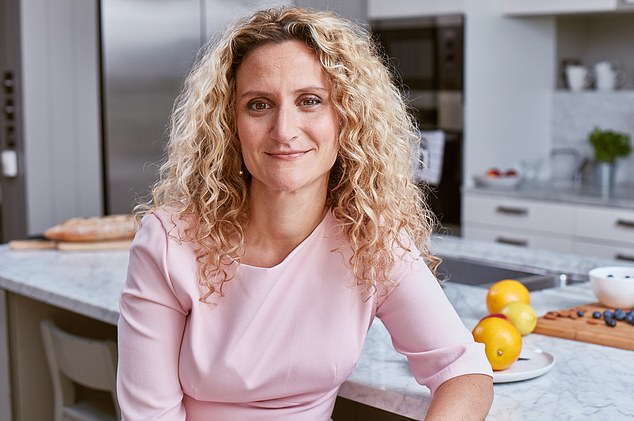
Whether GPs like to admit it or not, we all have colleagues who do not see patients. But please don’t tar us all with that brush. Pictured: Dr Ellie Cannon
GP FACTS
There are, on average, more than 1.2 million GP appointments in England every day, but more take place on Tuesdays than on any other day of the week.
Advertisement
Even if you do attend, at our surgery, a receptionist will take your number and a GP will call you back to assess what needs to happen next – be that another phone appointment with a nurse or doctor, or a face-to-face appointment. Unfortunately, some patients hate this.
Something else is happening, too. Put simply, demand is outstripping supply. To understand the situation, I want to take you back a bit.
As the country went into lockdown the first time, GPs were ordered by NHS England to close our doors to protect patients and staff alike. I remember that week in late March so clearly. It felt like a shocking thing to do.
But we adapted fast. Long before Covid, GPs were asked to offer remote consultations. It was an obsession of former Health Secretary Matt Hancock. It would, the Government hoped, streamline services that were creaking at the seams. And then Covid came along. Phone and online consultation became standard, practically overnight. Prescriptions were emailed to pharmacies, cutting out the frankly archaic process of patients having to visit the surgery to drop off and pick up paper copies.
As restrictions eased after the first wave, the practice where I work, like many, started offering a ‘blended’ service, with in-person consultations given when needed.
Many of my patients told me how happy they were with this. And for a moment, I saw a brighter future – a more convenient service for patients, and less pressure on healthcare workers, which would allow us to tend better to those who needed us most. After all, shopping, banking and even ordering food online are the norm today.
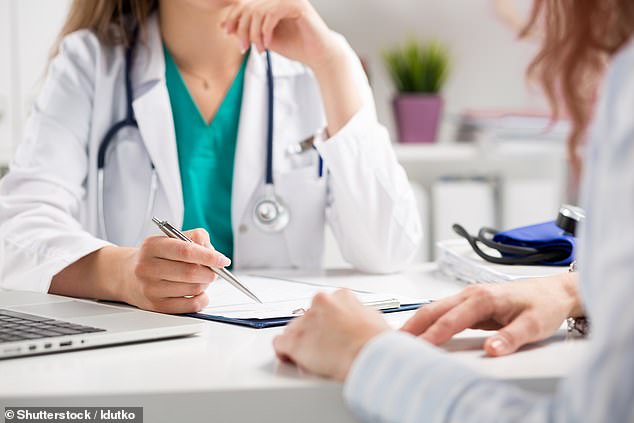
As restrictions eased after the first wave, the practice where I work, like many, started offering a ‘blended’ service, with in-person consultations given when needed (file photo)
HOW THE MoS HAS HIGHLIGHTED CRISIS FOR NEARLY A YEAR 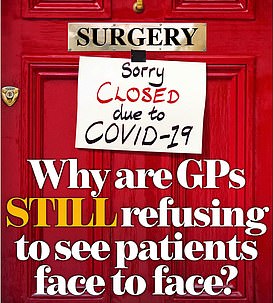
November 29 2020

May 9 2021
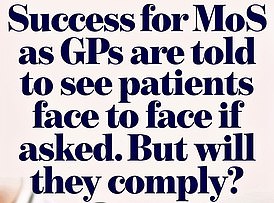
May 16 2021
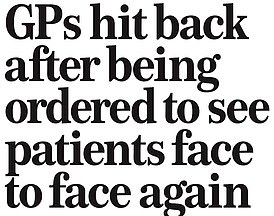
May 16 2021
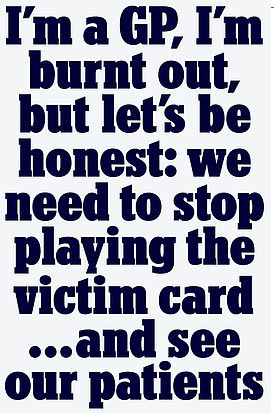
June 13 2021
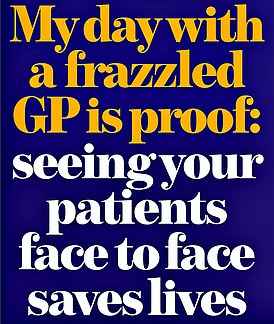
August 1 2021
Advertisement
In July last year I even wrote a column under the headline: ‘I never thought I’d say it, but NOT being able to see patients in person is good for them, me and the NHS.’ But the article triggered a surge of readers contacting us, revealing the litany of problems they’d faced while trying to access GP services during the pandemic.
One person described the process of getting into his surgery as ‘like trying to break into Fort Knox’. More worrying were the accounts of patients who’d not managed to see their GP and had subsequently developed fatal infections, or been diagnosed with late-stage, incurable cancer.
I’ve been vocal about my concerns that the relentless focus on Covid meant other areas of health were being sidelined. Last year, I penned an open letter to the then Health Secretary Matt Hancock, expressing these fears, and warning of the potential dire consequences. It was signed by 65 other doctors – but judging by the template response I got, I’m not even sure he read it.
Having devoted my life to NHS general practice, reading these readers’ stories broke my heart.
Aside from the distress being caused, it’s dangerous to suspend all face-to-face contact, as some things absolutely require a physical examination.
Thanks to our campaign, and the readers who’d bravely spoken up, NHS rules now state all GP practices must ensure they are offering face-to-face appointments.
Patients should be asked whether they’d rather have a remote or in-person appointment, and doctors should respect their preferences for face-to-face care unless there are good clinical reasons to the contrary, such as Covid symptoms. The key is choice. And yet, some GPs are still not complying. Why?
It’s likely to be down to a combination of factors.
It seems inconceivable, but back in the summer of 2020 we had few patients. I had whole clinics that were all-but-empty on some days.
Mistakenly, some people believed we had closed down entirely – others, perhaps, didn’t want to burden us, thinking we might be consumed by looking after Covid patients. The Government had to launch an initiative to remind people that GP and other NHS services were ‘open for business’.
But the illnesses and other problems we deal with every day hadn’t ceased to exist, they simply festered. And, as we now know, this created a mammoth pent-up demand.
And throughout the pandemic, normal hospital services, including minor and even some major surgery, was suspended. The focus on Covid has meant the NHS waiting lists in England is now five million people deep. There’s been some suggestion this figure could grow to 13 million. It’s staggering, and terrifying.
It also means many of these patients are coming back to GPs repeatedly for help.
For instance, I have one patient who needs a hernia operation. He’s in pain and has digestive problems. He can’t get out much now and his mental health is suffering. This could be solved by surgery, but we can’t get a date from his hospital team and so we have to try to manage him as best we can.
This is becoming a typical story – appointment after appointment, patients plead with us to contact their hospital consultant to ‘speed things up’. And we try, but we’re fairly powerless in the face of such a gargantuan backlog.
The pandemic has also led to a huge wave of mental health problems and social issues, and GPs are the first port of call for all of this. People rely on us for sick notes, housing letters and so much more.
We’re also running Covid and flu vaccine clinics, and all the normal stuff that must be done in person, such as child vaccines and baby and post-natal checks, asthma checks and blood pressure reviews.
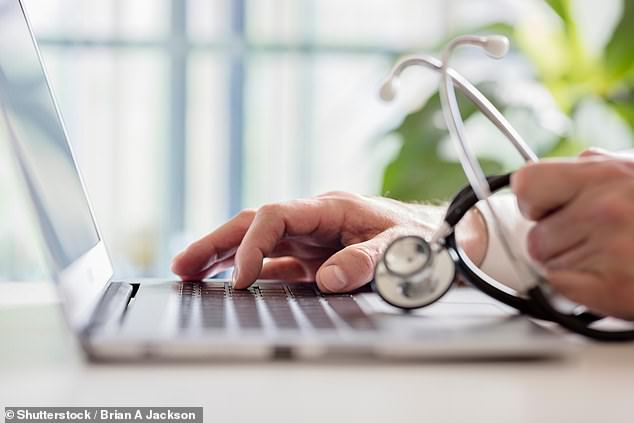
This is becoming a typical story – appointment after appointment, patients plead with us to contact their hospital consultant to ‘speed things up’. And we try, but we’re fairly powerless in the face of such a gargantuan backlog (file photo)
Even before the pandemic we were short of 6,000 GPs.
There’s a suggestion that we’re all off playing golf, rolling in cash and other myths. I’d just laugh it off but these sorts of lies are damaging and break down the trust that patients have in the medical profession. The danger is, without that trust, patients become less likely to seek help or follow medical advice. As we’ve seen from the horrors that have befallen those who’ve swallowed anti-vax messages, the results can be catastrophic.
The suggestions that doctors should be paid less, or barred from working part-time, are stupid. I notice no one is taking this sort of approach to solve the HGV driver crisis. Quite the opposite, in fact.
And something else happened which surprised us. The easy availability of electronic consultations – forms that are filled out online, then submitted, which then have to be read and assessed by a GP – has created a new monster. We’re now swamped with the most banal questions. The ins and outs of Covid restrictions, which can be read on the Government website, or questions about which tests they need for their holiday abroad.
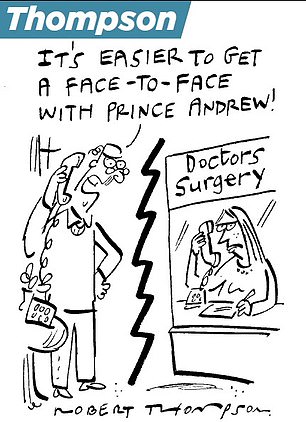
All these forms have to be read from start to finish by a GP, so we don’t miss an important problem.
I’ve long said patients can do a lot to help GPs by helping themselves – there are some who have become far too reliant on health services to solve problems they could manage with a little thought.
Back when I wrote that first article, outlining my hopes for digital services, I had cause for optimism. The switch to a phone-first approach had eradicated the problem of no-shows – patients who make an appointment, then don’t turn up. If someone doesn’t pick up their phone, we can move on to the next patient.
I accept there are practices that, unfortunately, have gone to extremes and are misusing the system, making grave mistakes about who should and shouldn’t be invited for a face-to-face appointment.
But in clinics where the regime is working, it’s working well. The average waiting time for a phone or video consultation is seven days, and for a non-urgent in-person appointment following an initial phone or online ‘triage’ consultation it’s nine days, according to a recent survey of GP-readers of Pulse magazine. Before the pandemic, the national average was two weeks’ wait, but that could be as long as a month at my own clinic. And I remember having to take half a day off work and sit for hours in a GP waiting room, while clinics ran interminably late.
Does anyone seriously want this to become the ‘default’ again? I believe a blended approach can work. And yes, that does mean speaking on the phone first. It sounds clunky but it is much better as long as the facility to see patients face-to-face is still there.
I became a GP as I like people. I want to be able to spend time with my patients. But at the moment, or until the Government manages to magic more GPs from somewhere, we might well have no other option but to continue as we are. Again, I want to say I understand why many patients are in despair. I read letters, week in, week out, that start: ‘I’ve given up trying to get an appointment with my own GP, so I’m writing to you for help…’
It’s vital all GPs listen. Local health chiefs need to look at what’s happening on ground level, and why some surgeries are failing, while others seem to be managing. And for the sake of everyone, we need to find a way forward, together.
Source link : https://www.dailymail.co.uk/health/article-10027919/DR-ELLIE-CANNON-Going-making-GP-appointment-face-face-make-things-worse.html











